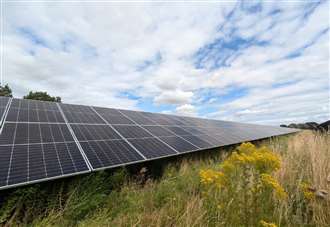The government has overruled a decision to block one of the largest solar farms in Kent from being built on farmland despite more than 120 objections.
Renewable energy firm RES appealed Sevenoaks council’s decision to refuse its scheme between Horton Kirby and Fawkham to the Planning Inspectorate in April.

It wanted to erect more than 100,000 panels alongside storage units, CCTV and other supporting infrastructure to generate 49.9MW of renewable electricity — enough to power 22,500 homes.
However, planning officers decided to reject the proposals for the fields at Speedgate Farm, between Mussenden Lane and the M20, in July last year.
They said the 245-acre project, known as Chimmens Solar Farm, would be an inappropriate development of the green belt and would mean the best and most versatile agricultural land would be lost.
They claimed it would also harm the setting of heritage assets, which includes grade II listed farm buildings and a former oast house, and hurt the landscape character and visual amenity of the area.
More than 120 objections to the scheme were submitted at the time, and a petition with around 700 signatures was also sent to the local authority.
Despite this, three letters of support were received praising the scheme for its provision of clean energy and the need to transition to renewable electricity.

Following the refusal, minor changes were made to the design, including removing all solar infrastructure from one of the fields, adding posts and fences along a public path and adding an extra skylark plot.
RES then confirmed that it was appealing the decision to the Planning Inspectorate, and an inquiry was held on June 17 and 18.
Inspector John Woolcock heard at an extraordinary meeting on April 8, Sevenoaks council reconsidered the case following recent policy changes and other appeal decisions.
The hearing was told that the local authority was withdrawing its reasons regarding the green belt and loss of agricultural land, as the site would now be known as the grey belt.
It added that the remaining issues were therefore “insufficient to outweigh” the proposals’ benefits, particularly the need for renewable energy generation.
In his decision report, published on July 23, Mr Woolcock confirmed the land would now be classified as grey belt, as it does not “contribute strongly to green belt purpose” like stopping the sprawl of built-up areas.

He did state it would cause encroachment on the countryside; however, overall, it did not “fundamentally undermine the purposes” of the remaining green belt in the area.
The report added that it would be “necessary to use agricultural land” due to the scale of the solar farm and that land of poorer quality is unavailable.
He also ruled in favour of the scheme due to its biodiversity benefits, which will see enhancements like wildflower meadows, grassland planting and bird and bat boxes included.
Residents did raise concerns over the loss of wildlife, particularly skylarks, as the proposals would cause six to eight territories to be lost.
Although Mr Woodcock said this would be an “adverse impact” locally, overall, the other biodiversity benefits tip the balance in favour of the plans.
He did, however, share Sevenoaks council’s concerns over the impact on the character and appearance of the area and heritage assets.

The inquiry found that the project would initially have a major significance visually and would temporarily cause “low-level” harm to the local character of the area and heritage buildings.
Despite this, he decided to uphold the appeal and approve the Hertfordshire-based firm’s planning application.
Project manager at RES, Sarah Rocks, said: “We welcome the Planning Inspectorate’s decision to allow the appeal, granting planning permission for Chimmens Solar Farm.
“RES has a track record of working with local supply chains and investing in communities. Chimmens will be no different, and we look forward to delivering economic, social and environmental benefits to the local area.
“We will now take the opportunity to carefully review the decision and any associated planning conditions, before taking the project to construction.”
Once built, the solar farm will be in operation for 40 years.
